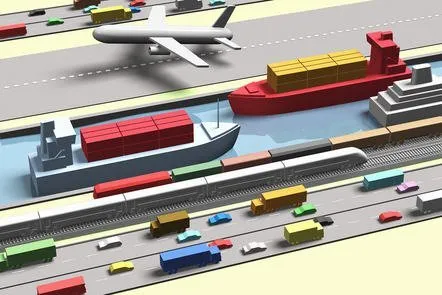
Principles of Global Logistics Management 
This course will provide an introduction to global logistics management, exploring the issues created by globalisation. You will learn about logistics and supply chains, physical characteristics of goods, inventory, outsourcing, trade blocks, and the problems caused by globalisation. This course is designed for business professionals looking to improve their logistics, supply chain, or distribution skills. ▼
ADVERTISEMENT
Course Feature
![]() Cost:
Cost:
Free
![]() Provider:
Provider:
Futurelearn
![]() Certificate:
Certificate:
Paid Certification
![]() Language:
Language:
English
![]() Start Date:
Start Date:
18th May, 2020
Course Overview
❗The content presented here is sourced directly from Futurelearn platform. For comprehensive course details, including enrollment information, simply click on the 'Go to class' link on our website.
Updated in [May 25th, 2023]
This course provides an overview of the principles of global logistics management. It covers the definition of logistics and supply chains, the physical characteristics of goods, inventory, outsourcing, trade blocks, and the problems caused by globalisation. It is designed to help business professionals improve their logistics, supply chain or distribution skills.
Possible Development Directions:
This course provides a foundation for further study in global logistics management. It can be used to develop a deeper understanding of the principles of global logistics, and to explore the various strategies and techniques used to manage global supply chains. It can also be used to develop an understanding of the challenges posed by globalisation and the potential solutions to these challenges.
Related Learning Suggestions:
This course is a great starting point for those interested in global logistics management. It can be used to develop a deeper understanding of the principles of global logistics, and to explore the various strategies and techniques used to manage global supply chains. It can also be used to develop an understanding of the challenges posed by globalisation and the potential solutions to these challenges. Additionally, it can be used to gain an understanding of the importance of inventory, outsourcing and trade blocks in global networks.
[Applications]
Upon completion of this course, participants can apply their knowledge to their own business operations. They can use the skills and knowledge gained to develop and implement strategies to improve global logistics management. Participants can also use the course to gain a better understanding of the global logistics industry and the challenges it faces.
[Career Paths]
1. Logistics Manager: Logistics Managers are responsible for overseeing the entire supply chain process, from the initial order to the final delivery. They must ensure that goods are delivered on time and in the most cost-effective manner. Logistics Managers must also be able to identify and resolve any issues that arise during the process. This role is becoming increasingly important as globalisation continues to increase and companies look to streamline their supply chain processes.
2. Supply Chain Analyst: Supply Chain Analysts are responsible for analysing data related to the supply chain process. They must be able to identify trends and patterns in the data and use this information to make recommendations for improvement. This role is becoming increasingly important as companies look to optimise their supply chain processes and reduce costs.
3. Distribution Manager: Distribution Managers are responsible for overseeing the distribution of goods from the point of origin to the point of sale. They must ensure that goods are delivered on time and in the most cost-effective manner. This role is becoming increasingly important as globalisation continues to increase and companies look to streamline their distribution processes.
4. International Trade Specialist: International Trade Specialists are responsible for managing the import and export of goods between countries. They must be knowledgeable about international trade regulations and be able to identify and resolve any issues that arise during the process. This role is becoming increasingly important as globalisation continues to increase and companies look to expand their international trade operations.
[Education Paths]
1. Bachelor of Science in Logistics and Supply Chain Management: This degree program provides students with a comprehensive understanding of the principles of logistics and supply chain management. Students will learn about the fundamentals of logistics, including inventory management, transportation, warehousing, and customer service. They will also gain an understanding of the global logistics environment, including international trade regulations, customs, and global supply chain management. This degree program is ideal for those looking to pursue a career in logistics and supply chain management.
2. Master of Science in Logistics and Supply Chain Management: This degree program provides students with an advanced understanding of the principles of logistics and supply chain management. Students will learn about the fundamentals of logistics, including inventory management, transportation, warehousing, and customer service. They will also gain an understanding of the global logistics environment, including international trade regulations, customs, and global supply chain management. This degree program is ideal for those looking to pursue a career in logistics and supply chain management.
3. Doctor of Philosophy in Logistics and Supply Chain Management: This degree program provides students with an in-depth understanding of the principles of logistics and supply chain management. Students will learn about the fundamentals of logistics, including inventory management, transportation, warehousing, and customer service. They will also gain an understanding of the global logistics environment, including international trade regulations, customs, and global supply chain management. This degree program is ideal for those looking to pursue a career in logistics and supply chain management.
4. Master of Business Administration in Logistics and Supply Chain Management: This degree program provides students with a comprehensive understanding of the principles of logistics and supply chain management. Students will learn about the fundamentals of logistics, including inventory management, transportation, warehousing, and customer service. They will also gain an understanding of the global logistics environment, including international trade regulations, customs, and global supply chain management. This degree program is ideal for those looking to pursue a career in logistics and supply chain management.
The development trends in logistics and supply chain management are rapidly changing due to the increasing globalization of the economy. Companies are now looking for professionals who have the skills and knowledge to manage global supply chains and logistics operations. As a result, there is an increasing demand for professionals with advanced degrees in logistics and supply chain management. Additionally, the use of technology in logistics and supply chain management is becoming increasingly important, and professionals with knowledge of the latest technologies are in high demand.
Course Provider

Provider Futurelearn's Stats at AZClass
Discussion and Reviews
0.0 (Based on 0 reviews)
Explore Similar Online Courses

Introduction To Windows Server 2012R2

Intermediate ML: TensorFlow on Google Cloud

Python for Informatics: Exploring Information

Social Network Analysis

Introduction to Systematic Review and Meta-Analysis

The Analytics Edge

DCO042 - Python For Informatics

Causal Diagrams: Draw Your Assumptions Before Your Conclusions

Whole genome sequencing of bacterial genomes - tools and applications

Simulation for Logistics: An Introduction

Sustainability and Green Logistics: An Introduction

International Logistics: An Introduction
 Related Categories
Related Categories
 Popular Providers
Popular Providers
Quiz
 Submitted Sucessfully
Submitted Sucessfully
1. What is the main purpose of this course?
2. What is the target audience of this course?
3. What topics will be discussed in this course?


Start your review of Principles of Global Logistics Management